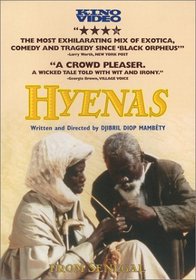| Actors: Ami Diakhate, Mansour Diouf, Calgou Fall, Faly Gueye, Mamadou Mahourédia Gueye Genres: Indie & Art House, Comedy, Drama, Special Interests Sub-Genres: Indie & Art House, Comedy, Drama, Pregnancy & Childbirth Studio: KINO INTERNATIONAL Format: DVD - Color - Subtitled DVD Release Date: 10/28/2003 Original Release Date: 01/01/1992 Theatrical Release Date: 01/01/1992 Release Year: 2003 Run Time: 1hr 50min Screens: Color Number of Discs: 1 SwapaDVD Credits: 1 Total Copies: 0 Members Wishing: 3 MPAA Rating: NR (Not Rated) Subtitles: English |
Search - Hyenas on DVD
  | Hyenas Actors: Ami Diakhate, Mansour Diouf, Calgou Fall, Faly Gueye, Mamadou Mahourédia Gueye Genres: Indie & Art House, Comedy, Drama, Special Interests NR 2003 1hr 50min Studio: Kino International Release Date: 10/28/2003 Run time: 113 minutes |
Larger Image |
Movie DetailsSimilar Movies
|
Movie ReviewsA Great Filmmaker We Missed Peter Archanjo | Oak Park, IL | 02/10/2001 (5 out of 5 stars) "Hyenas is one of those films one cannot describe, because of the total sensiual experiance that comes out of it. Djibril Diop Mambety is an enigmatic figure in African Cinema. His first film, Touki Bouki, won an award at the Cannnes Film Festival in 1974. It was then almost 20 years until His next feature with a few shorts in between. This adaption of Friedrich Durrenmatt's, The Visit, takes the cold power of this story of spurned love to another level entirely. It becomes a metaphorical tales of materialism and consumerism and the value of human life in general. It has beautiful music,clever dialogue, ("...what is that you are smoking," Drame Dramen asks, "...if you were to ask it's name, it would say Havana..." replies the mayor of the town of Coloban.This film examines the revenge of a woman, Ramatou, driven out of town when she becomes pregnant by a married man. The Married Man, Drame Dramen, enlists the aid of two friends who lie and say she slept with her also to bring her character into question. She is driven from the town in disgrace. Twenty years later she returns a millionaire with the intention of buying justice and revenge with cold cash and consumer goods. Amidst surrealistics imagery of Washers Dryers and air conditioners she woes the villager to make them complict in her exacting that revenge. She wants the head of DFramen Drame...and the villagers may be all too willing to comply and the whispers begin.It is a timeless tale that seems to exist between now and then, a japanese woman chaffeur breaks out a cell phone in the mdidst of a dusty town on the edge of an eternal then....a crippled prosecutor, the peole of the town are colorful and brilliantly portrayed, the mayors seems a character from an African Oz...this is cinema at it's finest.I could go on but I would just like to encourage everyone to see this film. I know what I will be giving for gifts this year to close friends." Already a classic of the African Cinema webdak-com | Long Island (NY), USA | 09/06/2001 (5 out of 5 stars) "Setting, pace and characters are beautiful developed in this masterpiece of the African Cinema. Diop Mambety used F.Duerrenmatt's original freely, but with a strong own identity and style. An old lady returns to her poor home town, after she became rich. Wondering why, the people start to talk. Slowly the viewer discovers her story. The old lady is aristocratic every moment of the movie, even in non-aristocratic moments... Highly recommended for everybody, who likes real storytelling cinema." Don't Miss The Point Bookworm | DC | 04/15/2006 (5 out of 5 stars) "This film is much more than it appears. It is the story of the post colonial society, be it in Africa, Asia or elsewhere. The animals (hyenas, elephants, lions, etc,) are representations of types of people from various cultures that have been exploited by the "powers" of the world. More so than that the film is about the role of the World Bank in post colonialial societies. He shows how the oppressed have often become the oppressor. The film actually follows very closely with the plot of "The Visit." However, Mambety has proven that cinema can be reinvented. Cinematically, the movie is highly literary in that elements of foreshadowing and allegory resound throughout."
|




